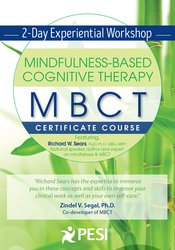

Are you like many other frustrated clinicians, wanting to incorporate mindfulness into your therapy practice but struggling to do so? All around you are mindfulness articles and workshops that are ineffective to give you concrete, practical skills to help your clients.
Take action today! An emerging evidence-based approach, called Mindfulness-Based Cognitive Therapy (MBCT) has proven effectiveness.
In this new experiential workshop recording, immerse yourself in the entire MBCT curriculum, an 8 session structured program that combines mindfulness and cognitive therapy techniques.
MBCT is evidenced based, and is an advanced clinical version of the popular Mindfulness Based Stress Reduction (MBSR).
Expert trainer Dr. Richard Sears will personally guide you step by step through core competencies of MBCT with passion, humour, and wisdom from his 30 years of teaching mindfulness. He will show you proven strategies for a wide range of psychological disorders, including:
Add this treatment approach to your toolbox to use with individual clients or group therapy. No stressing, just follow the 8 sessions laid out in this recording!
| File type | File name | Number of pages | |
|---|---|---|---|
| Manual - Mindfulness-Based Cognitive Therapy: Experiential Workshop (2.49 MB) | 47 Pages | Available after Purchase |

Richard Sears, PsyD, PhD, MBA, ABPP, is a licensed psychologist in Cincinnati, Ohio, board certified in clinical psychology by the American Board of Professional Psychology (ABPP), runs a private psychology and consultation practice, and is the director of the Center for Clinical Mindfulness & Meditation. He has run hundreds of mindfulness groups and was lead clinician in the first brain scan study involving mindfulness with children and adolescents. He is also an adjunct professor in the University of Cincinnati psychology department, clinical research faculty at the UC Center for Integrative Health and Wellness, volunteer professor of psychiatry & behavioral neurosciences at the UC College of Medicine, and a former research/psychologist contractor with the Cincinnati VA Medical Center.
His most recent books include ACT with Anxiety (PESI); The ACT Flip Chart (PESI); Cognitive Behavioral Therapy & Mindfulness Toolbox (PESI); Mindfulness: Living Through Challenges and Enriching Your Life in the Moment (Wiley-Blackwell); Building Competence in Mindfulness-Based Cognitive Therapy (Routledge); and Mindfulness-Based Cognitive Therapy for PTSD (Wiley-Blackwell).
Dr. Sears is a sixth-degree black belt in Ninjutsu, and once served as a personal protection agent for the Dalai Lama with his teacher, Stephen K. Hayes. He has studied Eastern Wisdom for over 40 years, receiving ordination in three traditions, and transmission as a Zen master.
Speaker Disclosures:
Financial: Dr. Richard Sears maintains a private practice and has employment relationships with the University of Cincinnati College of Medicine, the University of Cincinnati for Integrative Health and Wellness, Alliance Integrative Medicine, and Wright State University School of Professional Psychology. He receives compensation as a consultant and royalties as a published author. Dr. Sears receives a speaking honorarium, recording, and book royalties from PESI, Inc. He has no relevant financial relationships with ineligible organizations.
Non-financial: Dr. Richard Sears is a member of the Association for Contextual Behavioral Science, a diplomate of the American board of Professional Psychology, and a fellow with the Academy of the American Board of Clinical Psychology. He is a peer reviewer for Mindfulness and a book reviewer for John Wiley & Sons, Inc, and Routledge. He is the director of Center for Clinical Mindfulness and Meditation.
Please wait ...